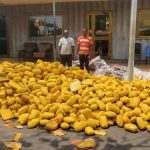The Minister for Food and Agriculture, Dr Owusu Afriyie-Akoto has charged the newly inaugurated Board of Directors of Ghana Cocoa Board (COCOBOD) to solve all financial constraints facing Licence Buying Companies (LBCs).
This, he said, would take the LBCs out of the weak positions they found themselves in accessing the required funds for the purchase of cocoa and other important operations, which are critical to the economy and farmers in particular.
Speaking at the inauguration of the newly inaugurated Board in Accra on Wednesday, August 11, he said, “we have to make sure that the financing of the bigger crop is done without impeding on the finances of the farmers. Because we have, had a lot of complaints from farmers about delayed payments.”
In addition, the Agric minister asked the board to work closely with the Secretariat of the Ghana-Cote d’Ivoire Coaoa Initiative in the implementation of the Living Income Differential (LID) to improve the income of local cocoa farmers.
Aside these, he urged them to pay attention to the cocoa marketing, and implement measures to augment cocoa production in the country.
While underscoring the effect of the COVID-19 pandemic in global demand for cocoa beans last year, Mr Afriyie-Akoto, said, he was hopeful that, “with the pickup in the world economy, the demand will be re-established, and we will be able to dispose of all the cocoa that we are expecting to harvest in the year.”
On the part of the cocoa sector regulator, the Board Chairman, Peter Mac Manu said, they would speed up the implementation of existing policies, especially the productivity enhancement programme, which he opined, contributed significantly to the success chalked during the 2020/2021 cocoa season.
“The policies administered by my predecessor has contributed positively to farmers’ production and income, which is of key interest to this administration and I am looking forward to build on it. I want to maintain the current production in the country and I believe with the help of such a strong team with much experience in the industry, we will increase it,” Mr Manu said.
He noted that despite the gains made in improving the income level of cocoa farmers, more work was needed to bring farmers’ incomes to a level where the youth of the country would find cocoa farming attractive.
The Board Chairman of COCOBOD maintained that the responsibility was theirs to provide policy direction that would “lead to the attainment of this objective, and this duty we will discharge to the best of our abilities.”
To this end, he pledged that they would work to consolidate the gains made, strengthen and accelerate the implementation of ongoing policies, projects, programmes, and initiatives to achieve sustained improvement in yield to ensure sustainable incomes for cocoa farmers.
By so doing, the Board would work together with all stakeholders in the cocoa value chain to improve on irrigation and pollination to make farmers produce and earn more.
The 11-member board includes the Chief Executive of COCOBOD Joseph Boahen Aidoo, Governor of the Bank of Ghana (BoG) Dr Ernest Addison, Minister of State at the Finance Ministry Charles Adu-Boahen, and Deputy Minister of Agriculture Yaw Frimpong Addo.
There is also the Deputy Trade Minister Herbert Krapah, a representative of workers of COCOBOD Edward Okoh Ampofo, a businessperson Nana Adwoa Dokua, as well as the Member of Parliament for the Suhum Constituency Kwadjo Asante, and other government representatives on the Board.
READ ALSO: COCOBOD Targets 1million Tonnes In 3yrs
In October last year, COCOBOD set its eyes on raising the country’s cocoa production to about one million tonnes in three years.
This comes following the introduction of the cocoa farm rehabilitation programme, by cutting down all unhealthy cocoa trees and replant them, to reverse the devastation caused by the cocoa swollen shoot disease (CSSVD).
The government allocated over US$200 million of the US$600 million syndicated loan facility it secured from the African Development Bank (AfDB) to the national rehabilitation programme.
Despite its projected 900,000 metric tonnes of cocoa beans for 2019, the government was able to achieve a little over 700,000 metric tonnes.
However, with the rehabilitation programme and other initiatives, the government is hopeful of achieving the one million tonnes target.
















